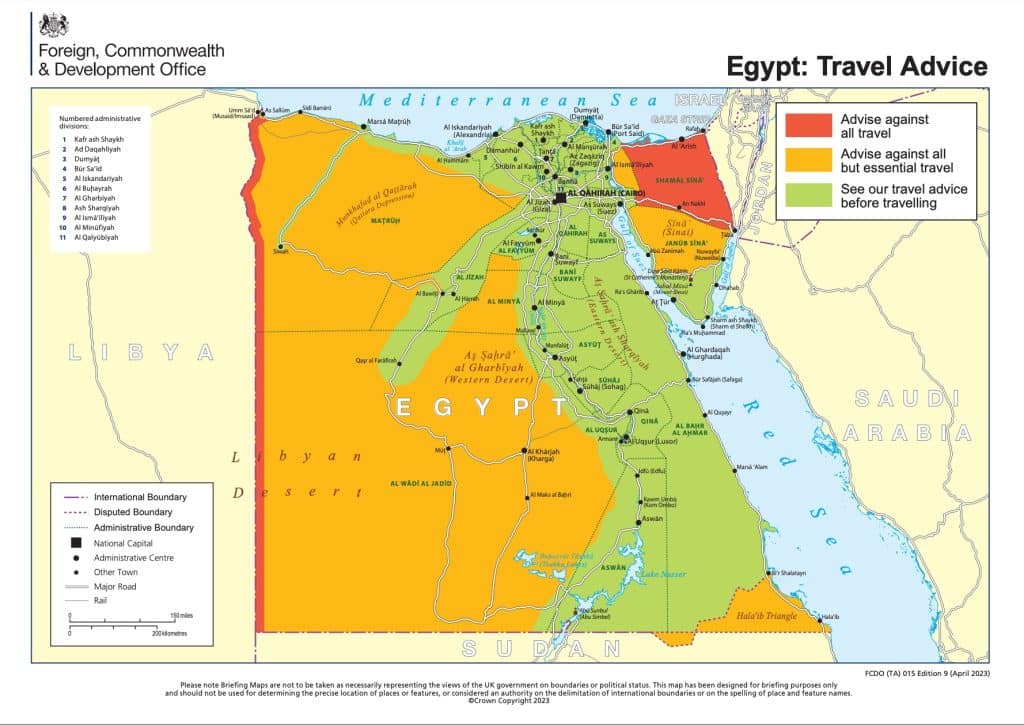Egypt is a place that every traveler must visit at least once in their life. But should you travel to this ancient country during the conflict in Israel?
Overall, Egypt is a safe place to visit. You may encounter petty crime and scams, but that is the extent of crime in this country.
Pickpockets are undoubtedly a problem in Egypt’s major cities, especially Cairo.
LATEST UPDATES / NEWS from Egypt:
October 13: British Foreign Office warns against traveling to some parts of Egypt, MAP issues travel advice
The British Foreign Office does not discourage travel to popular Egyptian destinations such as Sharm el Sheikh, Hurghada and Cairo. However, it does offer travel advice and urges travelers to avoid the following regions:
- Areas within 20 km of the Egypt-Libya border
- North Sinai
- Northern part of South Sinai
- Eastern part of Ismailiyah Governorate
- Western Desert (additional information on their official web page)
- Hala’ib triangle and Bir Tawil trapezium
On October 8, an unfortunate incident occurred in Alexandria when a police officer shot at Israeli tourists and their Egyptian guide, resulting in tragic casualties, amid escalating tensions.
The US Embassy in Cairo has warned American travelers to exercise caution amid concerns that the recent deadly attack on two Israeli tourists in Alexandria could be linked to the ongoing hostilities between Israel and Palestinian militants.
On Sunday, an Egyptian police officer fired his weapon in the Mediterranean city of Alexandria, resulting in a tragic loss of life. deaths of at least two Israeli tourists and one Egyptian. This information was conveyed by both Israeli and Egyptian officials.
U.S. Department of State Travel Advisory for Egypt – Level 3: Reconsider Travel
The US government did that issued a travel warning recommending travelers “reconsider travel to Egypt due to terrorism.” The statement said visitors should “exercise increased caution in Egypt due to the embassy’s limited ability to assist U.S.-Egyptian dual nationals who have been arrested or detained.”
The embassy advises against travel to:
- “The Sinai Peninsula (excluding travel to Sharm El-Sheikh by air) due to terrorism.
- The Western Desert as a result of terrorism.
- Egyptian border areas due to military zones.”
According to the advisory, terrorists may target diplomatic buildings, tourist destinations, transit hubs, markets and shopping centers, Western businesses, restaurants, resorts and local government buildings. Such attacks can occur with little or no notice.
Common scams to look out for when in Egypt
Egypt is a fairly safe country to travel to if you are careful and observe local cultural customs. Although crime is low in Egypt, beware of pickpockets and scammers.
However, if you visit tourist destinations, especially religious sites, consider the risk. Attacks on tourist sites do occur, but when checking local news sources about the threat situation, avoid large crowds, beware of religious or public festivals that could spark demonstrations or riots, and choose to travel in a small group.

1. Scam with overpriced items
This scam is typical when visitors go shopping, and usually occurs in village markets where the trader simply increases the price to make more money, and then you have to bargain. By negotiating boldly, you avoid paying too much and also relieve the burden on the next tourist.
2. Fake Cry Story scam
The stories of fake crying are endless; You will often find an impoverished individual crying for money because he or she has lost someone or because someone in their family is sick. No matter how the story seems, keep in mind that they are expert scammers and you should not get carried away.
3. Beach Fraud
Some beach scammers can steal your belongings while you are swimming in the Mediterranean or Red Sea. They simply take your belongings and flee to a location you could never reach. The best way to avoid this is to store your valuables in hotels if you don’t have someone to look after your belongings while you enjoy your time there. the sea.
4. Pickpocketing
This has deep roots that go back to the beginning of time, and it only gets better every year. This is a fairly common scam that most tourists fall victim to. The easiest method to avoid this major scam is to leave all your belongings and your passport at the hotel and take a photocopy with you.
5. Fake guides
This is another classic tourist scam in Egypt; You may often encounter people outside a transportation platform who promise to show you around. Whether you travel alone or with friends, don’t rely on them because you might ask a robber to show you around. When booking a guide, choose the hotels as they are more realistic.
6. Fake taxi companies
Taxi drivers offer cheap rides to famous tourist spots, but it’s a scam. You have to understand the technology; no one is going to be overly friendly to an underpriced ride without stealing the point from you. Remember this!
7. Fake police
It’s hard to tell the difference between real and fake, so pay attention to their body language when they ask for your login details. Although uncommon, these tourist scams do occur in Egypt. If you notice anything strange, politely ask them to back off and threaten to call the local station.
8. Fake cashiers and bartenders
This can happen to anyone at any time and without warning. Even after you pay, you are told that you have not paid in the local taverns and cafes. When you pay in cash, it also says that you have not paid the entire amount. This has the potential to go extremely far, and they may have accomplices. You should check this again before paying and choose to pay by card, but be careful with your code.
Important recommendations to observe mind:
- Keep an eye out in areas frequented by Westerners.
- Avoid crowds and demonstrations.
- Ensure adequate health insurance, including evacuation.
- Register with the Smart Traveler Enrollment Program (STEP) to receive alerts and help emergency services find you more easily.
- Follow the Ministry of Foreign Affairs on Facebook and Twitter.
- Study the Country Security Report for Egypt.
- Create a contingency plan in case an emergency occurs. View the traveler checklist.





